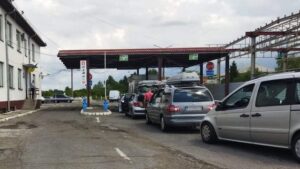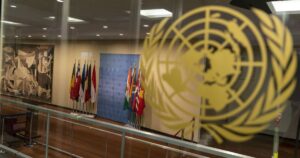
Ukrainian President Volodymyr Zelensky has appointed Valery Vavrynyuk, first deputy head of the State Border Service of Ukraine, as acting head of the SBU.
The corresponding decree No. 10/2026 of January 4, 2026, was published on the website of the President of Ukraine.
Valery Vavrynyuk was appointed first deputy head of the State Border Guard Service on October 20, 2025, according to his biography on the State Border Guard Service website.
In 2023, he was appointed head of the Western Regional Administration, and in 2019, head of the Eastern Regional Administration of the State Border Guard Service.
Until October 2019, he was appointed to the positions of head of border detachments in the Eastern and Western Regional Administrations and to positions in the Eastern Regional Administration of the State Border Guard Service.
From December 2014 to July 2015, he was deputy head of the regional administration and head of the operational and military department of the Eastern Regional Administration of the State Border Guard Service.
From 2008 to 2014, he held management positions in border guard units in the Northern and Southern Regional Administrations of the State Border Guard Service.

Passenger traffic across the Ukrainian border during the New Year week, from December 27 to January 2, fell by approximately 28.5%, according to data from the State Border Service, which does not include information for December 30.
According to the data, the number of border crossings for departure fell to 232,000 (for comparison, data for December 30 and 23 are not included) from 278,000 a week earlier, while the drop in arrivals was even more significant – to 184,000 from 304,000.
The number of vehicles that passed through checkpoints this week also fell to 77,000 from 109,000 a week earlier, and the flow of vehicles carrying humanitarian cargo fell to 268 from 373.
At the same time, this Saturday, the number of entries increased to 50,000, and exits to 53,000, so queues returned to the border.
According to the State Border Service, as of 3:00 p.m. on Sunday, most of the cars waiting to leave Ukraine at the Krakivets checkpoint were passenger cars – 85. The queue at the Hrushev checkpoint consisted of 50 cars, at the Ustyluh checkpoint – 45, at the Uhryniv checkpoint – 30 cars, and at the Shehyni checkpoint – 20. In addition, 12 buses had accumulated at the Shehyni checkpoint and nine at the Krakivets checkpoint.
Thirty cars were waiting to cross the border with Slovakia at the Uzhhorod and Maly Berezny checkpoints, and three buses were waiting in line at the Uzhhorod checkpoint.
The queues at the border with Hungary were shorter: 15 cars had accumulated at the Tisa, Luzhanka, and Dzvinove checkpoints.
According to the State Border Service, there were no queues at the border with Romania, while at the border with Moldova, there was only a queue at the Mamalyga checkpoint, with 10 cars.
The total number of border crossings this week is roughly the same as last year. During a similar week last year (data for December 30 is not included for comparison), 231,000 people left Ukraine and 196,000 entered, while the flow of cars amounted to 79,000.
Last year, a 22.7% drop in passenger traffic was recorded during this week, and the following week it increased by 16.9%.
As reported, from May 10, 2022, the outflow of refugees from Ukraine, which began with the start of the war, was replaced by an influx that lasted until September 23, 2022, and amounted to 409,000 people. However, since the end of September, possibly influenced by news of mobilization in Russia and “pseudo-referendums” in the occupied territories, followed by massive shelling of energy infrastructure, the number of those leaving exceeded the number of those entering. In total, from the end of September 2022 to the first anniversary of the full-scale war, it reached 223,000 people.
During the second year of full-scale war, the number of border crossings to leave Ukraine, according to the State Border Service, exceeded the number of crossings to enter by 25,000, during the third year by 187,000, and since the beginning of the fourth year by 224,000.
As Serhiy Sobolev, then Deputy Minister of Economy, noted in early March 2023, the return of every 100,000 Ukrainians home results in a 0.5% increase in GDP.
In its July inflation report, the National Bank worsened its migration forecast: while in April it expected a net inflow of 0.2 million people to Ukraine in 2026, it now forecasts a net outflow of 0.2 million, which corresponds to the estimate of the net outflow this year. “Net return will only begin in 2027 (about 0.1 million people, compared to 0.5 million in the previous forecast),” the NBU added and confirmed this forecast at the end of October. In absolute terms, the National Bank estimates the number of migrants currently remaining abroad at about 5.8 million.
According to updated UNHCR data, the number of Ukrainian refugees in Europe as of December 11, 2025, was estimated at 5.311 million (5.331 million as of November 14), and 5.860 million (5.850 million) worldwide.
In Ukraine itself, according to the latest UN data for September this year, there are 3.694 million internally displaced persons (IDPs), compared to 3.340 million in July.

Ukrainian President Volodymyr Zelensky held interviews with candidates for the posts of regional administration heads on Sunday, he wrote on his Telegram channel.
“The conversations were thorough. I am grateful to everyone who is ready to take responsibility for the situation in the region and serve our state and people. Appointments will be made in the near future for the Vinnytsia, Dnipropetrovsk, Poltava, Ternopil, and Chernivtsi regions. I would like to thank the leaders who have served in these positions. The names of the new leaders will be announced after the formal procedures for preparing the appointments are completed,” the president said.
He noted that the key task of the leaders will be to strengthen local self-government, community resilience, and the ability of regions to protect lives and help communities in need. “Each of our regions, all our cities and communities must stand shoulder to shoulder in defending all of Ukraine,” Zelensky added.

The majority of Ukrainians (62%) named the social network Telegram as their source of news and information, according to the results of a survey conducted by the international research company Ipsos on November 14-28, 2025, the results of which are available to the Interfax-Ukraine agency.
Specifically, 84% of Ukrainians aged 18-24 named Telegram as their source of news and information, 87% of those aged 25-34, 79% of those aged 35-44, and 74% of those aged 45-54. However, among those aged 55-64, 51% of respondents get their information from Telegram, and among those over 65, only 30%.
Less than half of those surveyed named all other sources.
In second place is television, from which 49% of respondents get their news and information, with the majority of them belonging to the two older age groups (54% aged 55-64 and 76% aged 65 and older). However, only 23% of young people aged 18-24 get information and news from television, compared to 32% of those aged 25-34, 36% of those aged 35-44, and 43% of those aged 45-54.
YouTube ranks third: 46% of respondents get news and information from this source, with almost equal representation across all age groups (from 41% among those over 65 to 53% among those aged 45-54).
This is followed by personal communication, which was mentioned by 38% of respondents, also relatively evenly across all age groups (from 33% among those over 65 to 45% among those aged 25-34).
The social network Facebook is in fifth place, cited by 34% of respondents (from 26% among those over 65 to 43% among those aged 45–54).
TikTok was named as a source of news and information by 23% of respondents, with more than 30% among those under 35 and only 16-17% among those over 54. The situation is similar with social network X, which was named as a source of news and information by 6% of respondents — 13% among those under 25 and only 3% among those over 65.
Radio was named as a source of news and information by 18% of respondents, but only 8% of them were under 25 and 25% were over 65. The situation is similar with the press: it remains a source of news and information for 11% of respondents, but only 7% of them were younger than 25 and 14% were older than 65.
40% of respondents said they would trust personal communication as a source of information about potential candidates if it were announced in Ukraine, 38% said they would trust the social network Telegram, 35% trusted YouTube, 28% trusted television, 26% trusted Facebook, 18% trusted radio, 17% trusted the press and TikTok, 10% trusted social network X, and 57% trusted other sources.
At the same time, 29% of respondents do not trust television as a source of information about candidates, 26% do not trust TikTok, 24% do not trust the press, 22% do not trust radio, 20% do not trust Facebook, and 18% do not trust social network X. 14% of respondents do not trust personal communication and social network Telegram, 13% do not trust YouTube, and 11% do not trust other sources.
During the study, 2,000 respondents aged 18 and older were surveyed in all government-controlled regions of Ukraine, including 1,500 through personal interviews (CAPI) and 500 by telephone (RDD CATI). Quotas were not applied during data collection in order to preserve the probabilistic nature of the sample. The sampling error does not exceed 2.2% with a 95% confidence level.

Colombia, with the support of Russia and China, has initiated a meeting of the UN Security Council, Reuters reported, citing information from diplomats.
The agency also quotes an excerpt from a letter sent to the UN Security Council by Venezuela’s ambassador to the UN, Samuel Moncada.
” This is a colonial war aimed at destroying our republican form of government, freely chosen by our people, and establishing a puppet government that will allow our natural resources, including the world’s largest oil reserves, to be plundered,” Moncada wrote in a letter to the UN Security Council on Saturday, noting that the US had violated the UN Charter.

According to the results of 2025, Ukraine’s national currency, the hryvnia, remained relatively stable overall, despite pressure from the war, high budget expenditures, and volatility in foreign markets, according to the Experts Club information and analytical center.
Throughout the year, the official hryvnia-to-dollar exchange rate showed moderate fluctuations within the established corridor, remaining under the control of the National Bank of Ukraine (NBU). The cash and interbank markets saw short-term surges in demand for foreign currency, mainly during periods of peak budget payments and increased import activity, but these were quickly smoothed out by the regulator’s currency interventions.
According to market participants, the key factors supporting the hryvnia in 2025 were regular inflows of international financial assistance, the preservation of administrative measures of currency regulation, and the NBU’s policy of supporting the attractiveness of hryvnia instruments. International reserves also played a significant role, remaining at a level sufficient to cover short-term external obligations throughout the year.
At the same time, the hryvnia exchange rate continued to be pressured by the structural external trade deficit, high military and social spending, and uncertainty related to the duration of hostilities and the volume of future external support.

Quotations on the interbank currency market of Ukraine (UAH per USD, period from 01.01.2025 to 31.12.2025)
Maksym Urakin, founder of the Experts Club analytical center, notes that 2025 was a period of “managed stability” for the hryvnia.
“The hryvnia is ending the year without any sharp devaluation shocks, which, in the context of full-scale war and high budget dependence on external financing, can be considered a cautiously positive result. The key stabilizing factor remained the coordination of monetary and fiscal policy with the support of international partners,” he said.
According to him, maintaining control over the currency market has helped to avoid panic among the population and businesses, but in the medium term, the risks for the hryvnia remain high.
“The further dynamics of the exchange rate will directly depend on the volume of foreign aid, the situation on the front lines, and the pace of economic recovery,” Urakin stressed.
Inflationary processes in 2025 also remained one of the sensitive factors for the currency market. Rising consumer prices increased demand for currency from the population, but this effect was partially offset by monetary policy measures and the maintenance of capital movement restrictions.
The NBU has repeatedly emphasized that its exchange rate policy remains flexible and adaptive, and that the regulator’s priority is financial stability and inflation control, rather than achieving formal exchange rate targets.
Experts note that in 2026, the hryvnia’s dynamics will largely depend on the pace of economic recovery, the volume of international aid, and decisions on further currency liberalization.